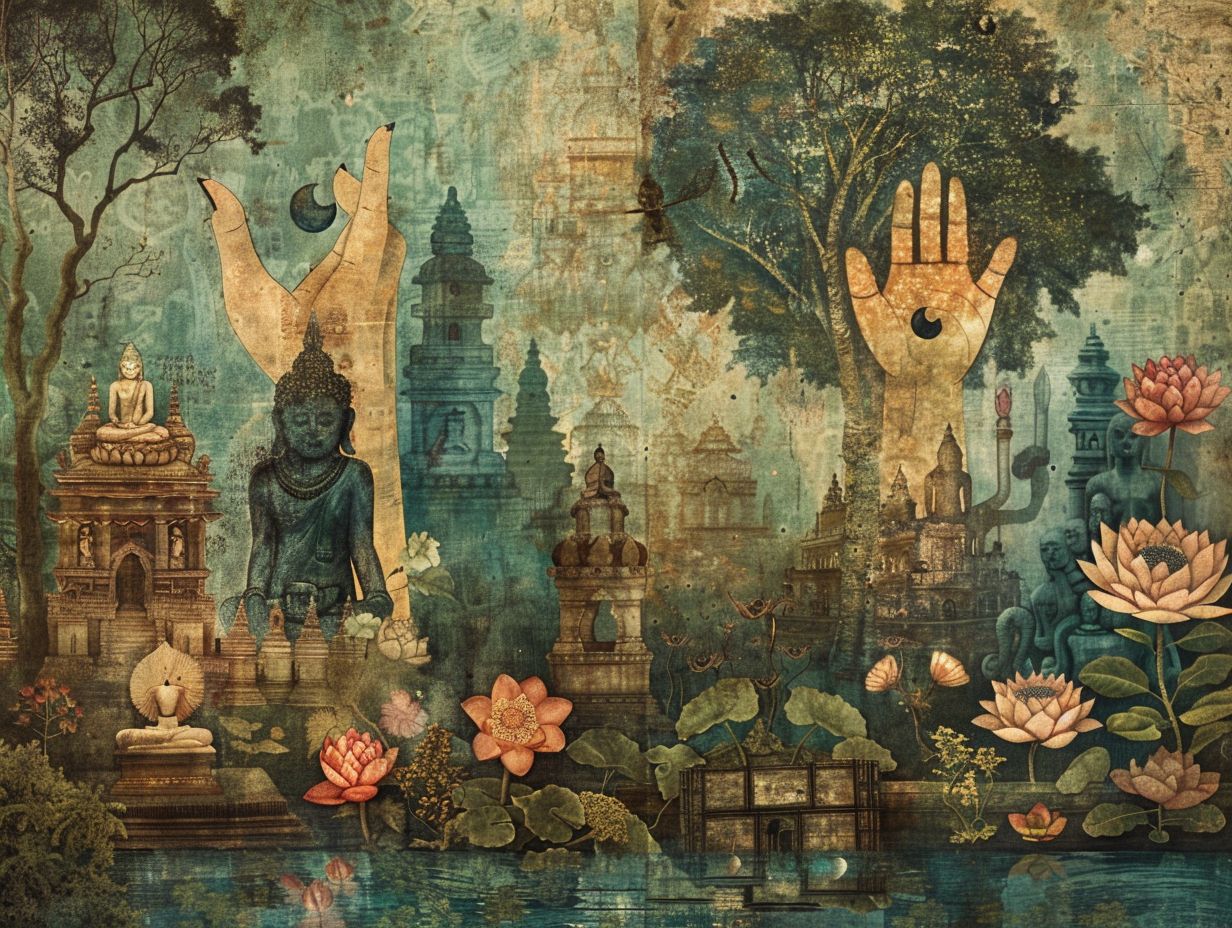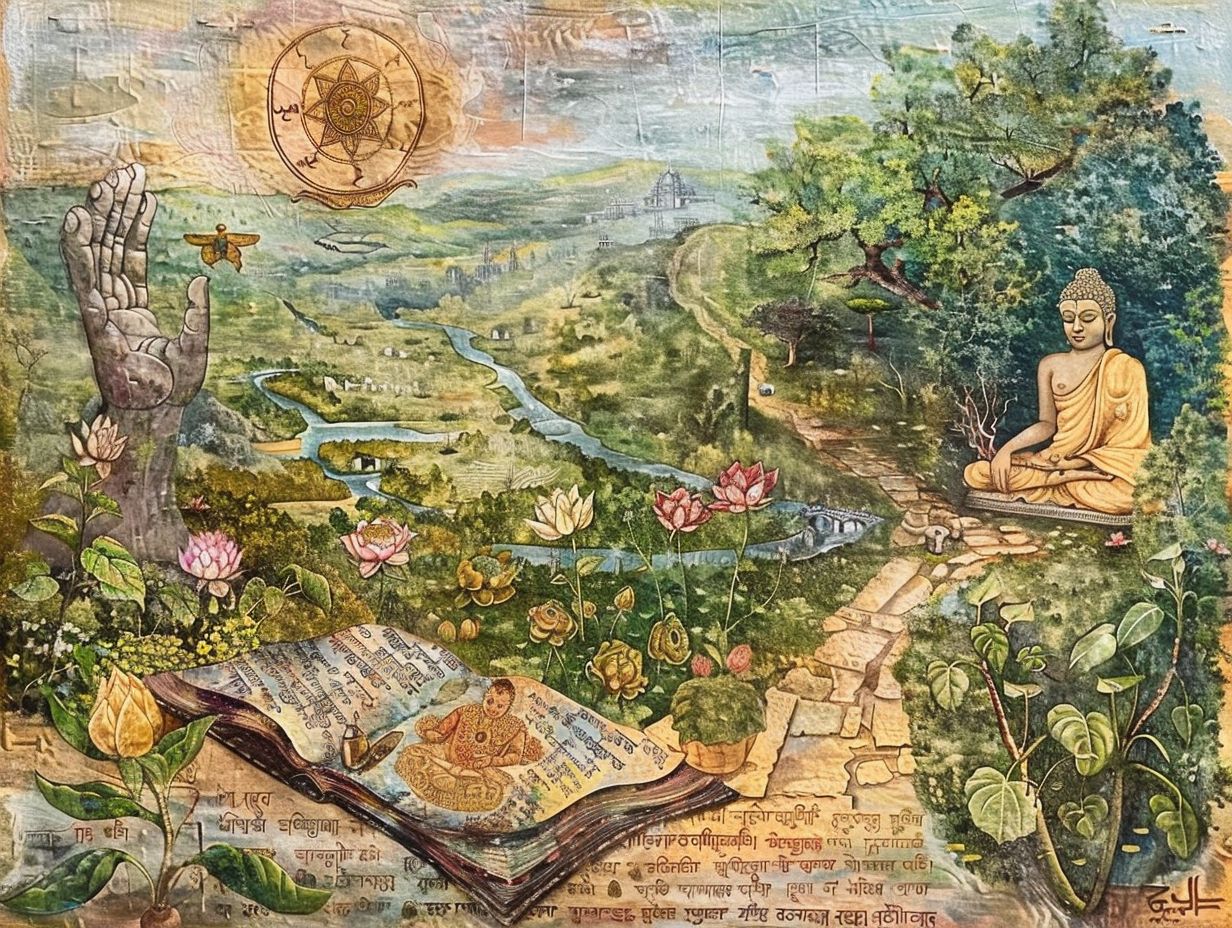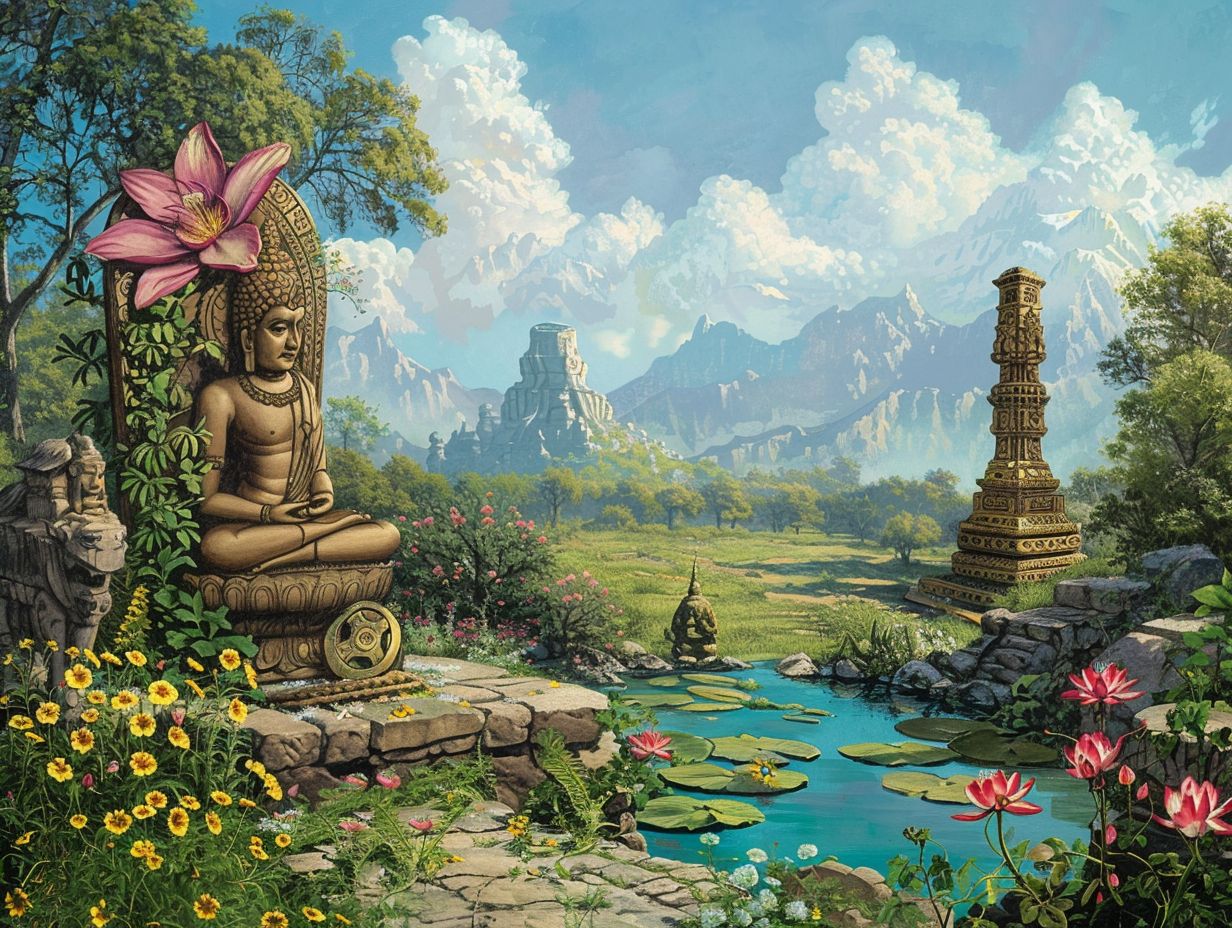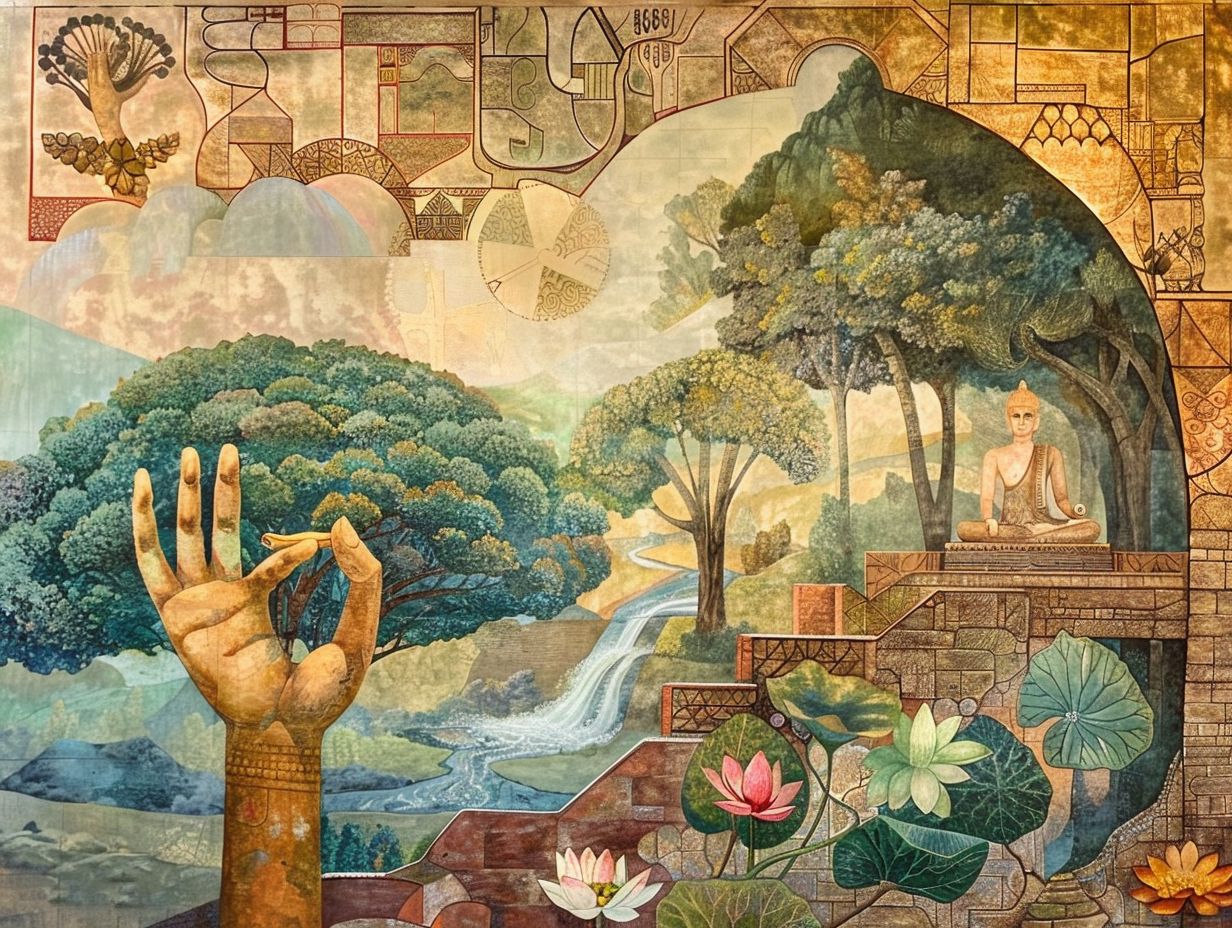Major Schools: Jainism, Buddhism, Charvaka, Ajivikas
Exploring the rich tapestry of Indian philosophy unveils a captivating interplay among its major schools of thought: Jainism, Buddhism, Charvaka, and Ajivikas.
Each of these traditions presents unique core beliefs and practices that have not only shaped spiritual paths but also influenced cultural landscapes. This comprehensive overview delves into the essential tenets of each school, scrutinizing their rituals and philosophies, while illuminating both their similarities and differences.
The journey reveals the profound impact these traditions have had on Indian culture and society, inviting an appreciation of their enduring legacy.
What is Jainism?

Jainism, an ancient Indian religion, places a profound emphasis on non-violence (ahimsa), truth, and the pursuit of spiritual liberation through a disciplined approach to life. Engaging in practices such as meditation and asceticism, this faith provides a rich historical context that invites a unique philosophical exploration of existence and the nature of reality.
At its core, Jainism advocates for a deep understanding of karma and dharma, which are essential components of its belief system. The teachings of the Tirthankaras serve as guiding lights for adherents on their journey toward enlightenment and ethical living, cultivating a strong sense of community and the monastic traditions that define Jain practices.
What are the Core Beliefs of Jainism?
The core beliefs of Jainism are anchored in the principles of non-violence (ahimsa), karma, and dharma, which guide followers in their spiritual development and ethical conduct through adherence to the five great vows.
These vows encompass non-violence, truthfulness, non-stealing, celibacy, and non-possessiveness, each serving a critical role in shaping the lives of adherents. The vow of non-violence stands as the foundational tenet, underscoring the importance of respect for all living beings and fostering a spirit of compassion.
Truthfulness encourages integrity, while the principle of non-stealing cultivates respect for the belongings and rights of others. Celibacy is regarded as a means to focus one’s energy on spiritual endeavors, while non-possessiveness aids individuals in detaching from material possessions, promoting spiritual liberation.
Collectively, these vows interweave with the concepts of karma and dharma; by following them, adherents accumulate positive karma and fulfill their dharmic responsibilities, ultimately paving their path to liberation from the cycle of birth and death.
What are the Practices and Rituals in Jainism?
Jain practices and rituals are profoundly anchored in asceticism and meditation, showcasing a disciplined approach to ethical living and spiritual development within a nurturing community.
The community actively participates in a variety of traditions that reinforce these principles, such as meditation, which fosters mindfulness and self-reflection, enabling individuals to cultivate inner peace and compassion. Fasting, another cornerstone practice, is regarded not merely as a means of purification but as an opportunity to deepen one s connection with both the self and the universe.
Rituals, including communal prayers and celebrations, enhance a sense of belonging and shared values while underscoring the paramount importance of non-violence and truthfulness. Through these enriching practices, members of the community discover pathways for moral growth, encouraging a lifestyle that embodies the fundamental tenets of Jain philosophy.
What is Buddhism?
Buddhism stands as a profound spiritual and philosophical tradition, rooted in the teachings of Siddhartha Gautama, widely recognized as the Buddha. He elucidated the Four Noble Truths and the Eightfold Path, offering a framework to comprehend the nature of suffering and the path toward spiritual liberation.
Central to Buddhism is the practice of mindfulness meditation, an essential practice that guides practitioners on their journey toward enlightenment and liberation from the cycle of rebirth. This tradition emphasizes the significance of grasping the essence of existence and the transient nature of life, all in the pursuit of true happiness and the cessation of suffering.
What are the Core Beliefs of Buddhism?
The core beliefs of Buddhism are anchored in the Four Noble Truths, which intricately examine the nature of suffering, desire, and the impermanence of life, establishing a pathway for followers to attain enlightenment through the Eightfold Path.
These truths serve as a mirror, reflecting the fundamental aspects of human existence and inviting practitioners to engage deeply with their own experiences of discomfort and longing. The First Noble Truth acknowledges the omnipresence of suffering, while the Second unveils desire as the root cause of this distress. The Third Noble Truth instills hope by suggesting that liberation from suffering is indeed attainable, and the Fourth offers a pragmatic approach through the Eightfold Path.
This path encompasses ethical and mental practices that guide individuals in their pursuit of alleviating suffering and cultivating wisdom. Ultimately, it transforms their relationship with desire and leads to a more compassionate and fulfilling way of living.
What are the Practices and Rituals in Buddhism?

Buddhist practices and rituals encompass a rich tapestry of activities, such as meditation and mindfulness, that nourish spiritual growth, compassion, and community engagement among practitioners. These elements transcend mere theoretical concepts; they represent lived experiences inviting each individual to explore their inner world more profoundly.
Through various forms of meditation, practitioners cultivate a heightened awareness and presence, which enables them to navigate life’s challenges with increased grace and resilience. Community gatherings whether they be celebrations of festivals or collective meditative sessions serve to reinforce the bonds of shared purpose and mutual support among participants.
Ethical conduct, a cornerstone of Buddhist philosophy, guides individuals in their interactions, fostering a lifestyle steeped in kindness and empathy. Collectively, these practices nurture a deep sense of interconnectedness and understanding, contributing to the formation of a more compassionate society.
What is Charvaka?
Charvaka, an esteemed ancient Indian philosophical school, is distinguished by its materialistic and skeptical perspective. It thoughtfully challenges the validity of spiritual doctrines while emphasizing the paramount importance of empirical evidence in the quest for truth and ethical living.
What are the Core Beliefs of Charvaka?
The core beliefs of Charvaka advocate for materialism and skepticism, asserting that knowledge must be grounded in empirical evidence while rejecting concepts such as the soul, rebirth, and divine intervention. This philosophical stance encourages individuals to concentrate on tangible experiences and observable phenomena, rather than abstract spiritual notions.
By dismissing the existence of an immortal soul or the idea of suffering in an afterlife, adherents promote a lifestyle that prioritizes present experiences and ethical conduct grounded in rational thought. This rejection of unproven beliefs not only shapes their worldview but also sparks critical discussions in philosophical debates, challenging traditional doctrines that emphasize spiritualism.
As a result, Charvaka s emphasis on evidence-based reasoning cultivates a practical approach to morality, prompting thinkers to assess actions based on their real-world consequences rather than on metaphysical assumptions.
What are the Practices and Rituals in Charvaka?
The practices and rituals associated with Charvaka are notably minimal, emphasizing a materialistic worldview and ethical considerations rooted in reason and skepticism. This approach stands in stark contrast to many other religious traditions, which often prioritize intricate ceremonies, rites of passage, and community gatherings rich in spiritual symbolism.
Within the framework of Charvaka philosophy, the focus is placed on individual experience and empirical evidence rather than on prescriptive rituals intended to appease divine forces. By championing a rational examination of existence and morality, this worldview encourages adherents to derive ethical principles from tangible truths rather than abstract metaphysical beliefs.
Consequently, the absence of traditional rituals cultivates a sense of personal responsibility and fosters genuine engagement with the world, thus distinguishing Charvaka’s ethos from the more ceremonially oriented practices of other faiths.
What is Ajivikas?
The Ajivikas represent an ancient Indian philosophical tradition distinguished by its deterministic worldview. This tradition posits that all events, including human actions, are predetermined by past karmic deeds.
Furthermore, it advocates for asceticism and ethical conduct as essential pathways to achieving liberation.
What are the Core Beliefs of Ajivikas?

The core beliefs of the Ajivikas center on determinism, asserting that all actions and outcomes are dictated by past karmic influences. This foundational view shapes their approach to asceticism and ethical conduct.
From this perspective, the Ajivikas perceive human efforts as ultimately futile in altering one’s predetermined fate, thus challenging conventional interpretations of karma as a means for personal transformation. Their acceptance of this deterministic framework cultivates a sense of resignation, rendering ascetic practices less about achieving liberation through self-discipline and moral behavior, and more about navigating the present life with a sense of equanimity.
As a result, ethical considerations may take a secondary role, as individuals might perceive their conduct as insignificant in the broader context, potentially dampening their motivation for altruism or righteous living.
What are the Practices and Rituals in Ajivikas?
Ajivika practices and rituals place a strong emphasis on asceticism and communal living, viewing ethical conduct as a vital pathway to liberation from the cycle of existence.
The ascetic lifestyle embraced by practitioners is marked by rigorous personal discipline, which includes fasting, meditation, and a deliberate renunciation of material possessions. These disciplines are designed to cultivate a profound understanding of karma the principle that every action carries specific consequences.
Community living is integral to this tradition, fostering a sense of collective support among its members and reinforcing their commitment to ethical living. The communal dimension is vividly illustrated through shared rituals, which often revolve around gatherings and discussions. During these moments, individuals engage in reflection on their actions and recognize their shared responsibility in pursuing collective spiritual growth.
Through participation in these practices, individuals not only aim to enhance their own lives but also contribute to the moral fabric of their community, creating a harmonious interplay between personal aspiration and communal responsibility.
Comparison of Major Schools
The examination of prominent philosophical schools, including Jainism, Buddhism, Charvaka, and Ajivikas, unveils noteworthy similarities and distinctions within their teachings, practices, and their respective influences on Indian culture and society.
Similarities and Differences between Jainism and Buddhism
Jainism and Buddhism exhibit a fascinating interplay of shared fundamental concepts, such as the pursuit of enlightenment and the paramount importance of non-violence. However, they part ways in their rituals, philosophical interpretations, and perspectives on the self.
Both traditions underscore the significance of ethical conduct and advocate for the cultivation of compassion towards all living beings. Nevertheless, the paths they chart toward liberation and the methods they embrace differ significantly. Jainism, for instance, places a pronounced emphasis on ascetic practices and a rigorous commitment to non-harming, which manifests in its intricate rituals and community practices designed to uphold these values.
In contrast, Buddhism advocates for a more meditative approach to comprehending suffering and the self, seamlessly integrating mindfulness into daily life rather than centering exclusively on asceticism. Thus, while their ethical teachings may converge around the principle of non-violence, the subtle distinctions in their respective rituals and philosophical frameworks delineate uniquely defined pathways toward liberation.
Similarities and Differences between Charvaka and Ajivikas
Charvaka and Ajivikas embody fundamentally opposing perspectives on existence, with Charvaka advocating for materialism and skepticism, while Ajivikas embrace a deterministic philosophy rooted in karma.
The Charvakas categorically deny the existence of an afterlife, promoting the pursuit of sensual pleasures in the present moment. In stark contrast, the Ajivikas assert that all events are predetermined by past actions, thereby minimizing the scope for individual agency.
These philosophical divergences manifest in their ethical frameworks; for the Charvakas, ethics derive from human experiences and tangible outcomes, whereas the Ajivikas regard ethical conduct as inconsequential to the inevitable unfolding of fate dictated by karma.
Ultimately, these contrasting philosophical positions not only shape their respective understandings of reality but also significantly influence their practices and lifestyle choices, illuminating the profound tension between hedonism and fatalism.
Influence of Major Schools on Indian Culture and Society

The influence of major philosophical schools such as Jainism, Buddhism, Charvaka, and Ajivikas has profoundly shaped Indian culture and society, offering a rich array of perspectives on ethics, spirituality, and the essence of existence.
These schools have not merely enriched the spiritual tapestry of the nation; they have woven values of compassion, non-violence, and critical inquiry into the very fabric of society. Jainism, with its steadfast emphasis on the principle of ahimsa, has significantly impacted Indian ethical thought. Meanwhile, Buddhism advocates for mindfulness and the pursuit of enlightenment as a pathway to alleviating suffering.
In contrast, the Charvaka school adopts a rational and materialistic approach to understanding reality, challenging traditional metaphysics and nurturing a spirit of intellectual freedom. Likewise, the Ajivikas contribute a distinctive perspective on determinism and the nature of fate, igniting discussions that resonate throughout the cultural and philosophical landscape of India.
This interplay of ideas fosters a vibrant dialogue surrounding existence and morality, enriching the collective consciousness of the society.
Frequently Asked Questions
What are the major schools of thought in ancient Indian philosophy?
The major schools of thought in ancient Indian philosophy include Jainism, Buddhism, Charvaka, and Ajivikas. These schools emerged between the 6th and 5th centuries BC and have greatly influenced Indian culture and beliefs.
What is Jainism and what are its main beliefs?
Jainism is an ancient Indian religion that focuses on non-violence, karma, and the liberation of the soul from the cycle of birth and death. Its main beliefs include the existence of eternal souls, the concept of right faith, right knowledge, and right conduct, and the importance of ahimsa (non-violence) in all aspects of life.
How does Buddhism differ from other major schools of thought in ancient Indian philosophy?
Buddhism was founded by Siddhartha Gautama and is based on the Four Noble Truths and the Eightfold Path. Unlike other major schools, Buddhism does not believe in a supreme deity and focuses on personal enlightenment and inner peace rather than external rituals and sacrifices.
What are the main principles of Charvaka philosophy?
Charvaka, also known as Lokayata, is a materialistic school of thought that rejects the existence of soul, afterlife, and the concept of karma. Its main principles include skepticism, hedonism, and the belief that only what can be perceived through the senses is real.
Who were the Ajivikas and what were their beliefs?
The Ajivikas were a sect of ascetics who believed in a deterministic worldview, where everything was predetermined by fate. They also believed in the concept of a universal force called niyati, which controlled the cycle of birth, life, and death. However, this school of thought eventually died out in the 14th century AD.
How did the major schools of thought influence Indian society?
The major schools of thought, including Jainism, Buddhism, Charvaka, and Ajivikas, played a significant role in shaping Indian culture and beliefs. These schools influenced concepts like non-violence, karma, and the pursuit of spiritual enlightenment, as well as the development of yoga, meditation, and other practices still used today.
